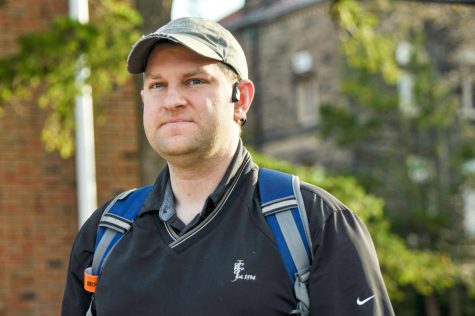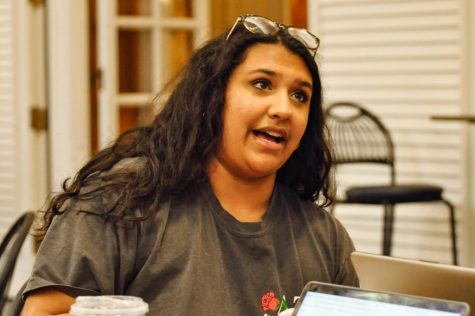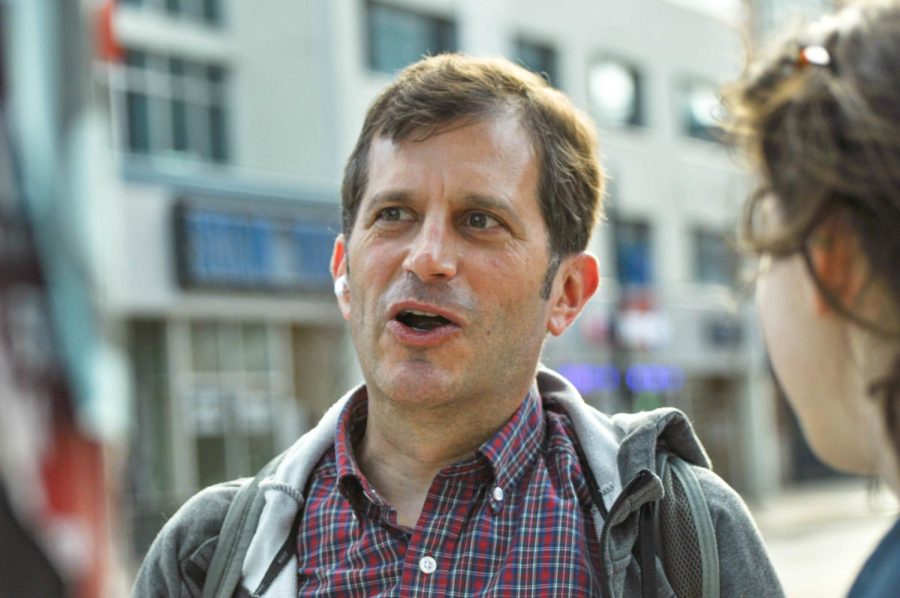Opinion | What is your perspective on community gun violence?
Kirk Sanders, associate professor in LAS, expresses how big of a concern gun violence is within the area especially when it comes to the safety of his children. Others around the community give incite on their concern with the rise in gun violence.
Apr 12, 2022
Every student at the University gets an Illini-Alert sent to their email when a crime is reported on campus. It’s nice to get those little notifications, but they’re far from the whole picture on crime and gun violence in the wider C-U community.
Data released by the Champaign police reveals that shooting incidents in 2021 were up 37% from 2020, a continuation of what appears to be a years-long upward trend. Students new to the area are worried about this unexpected — at least to most people — situation. On the other hand, longtime residents of the area are witnessing this change before their very eyes.
These humans of C-U, hailing from various positions in the community, give their perspectives on rising levels of gun violence and tackle the larger question of what can be done about it if anything.
Charles Blatti, research scientist at the National Center for Supercomputing Applications
“I do a lot of work with Habitat for Humanity, and a lot of the Habitat families that we’ve served over the last several decades are in areas where this gun violence is happening. And it’s just sad that they have an issue that they have to deal with regularly.
Get The Daily Illini in your inbox!

(Sydney Laput)
“There’s a Habitat family who is a victim of the gun violence. And so, it’s very disheartening that she was left — she died early because of the issues that have been boiling up since the pandemic began … (But) I don’t want Habitat to be associated with the gun violence.
“I think that it’s a very deep-rooted problem … There’s probably a lot of things that could be done and I think that the community members where the issues are the strongest should be definitely involved in those discussions of what they would like to be done. I don’t think it should be a solution prescribed from on high.
“I don’t have any concrete suggestions for curbing gun violence, other than encouraging people to value and respect the lives of others and hopefully offer opportunities so people who are involved in gun violence don’t feel like that’s their only choice.”
David Omana, senior in LAS
“It’s pretty rampant now. I live by (Clark Street, close to Neil), and every night, every other night, I hear gunshots.
“I feel fine walking, I haven’t had any problems at all with that, but I hear it all the time around more of the campus area. Not like gunshots, but things happening on campus, like people getting mugged or something or people getting stuck up with a gun, stuff like that.
“I do think that more gun control — background checks, those kinds of things — will help a lot. It would stop people from getting guns, it would make it less acquirable. It’ll take a long time, they’ll be less likely to do it, I guess.”
Simran Bhargava, freshman in LAS
“I’m an out-of-state student, so my parents get the alerts and it freaks them out a lot when they get them. I’m from North Carolina, so it’s hundreds of miles away, and they aren’t really used to that sort of violence on any campus. As concerning as gun violence is, I also feel very bad for my parents because I think they kind of freak out more when they get so many alerts, constantly.
“I just tell them that I’m safe. Thankfully, I haven’t had to personally deal with anything like that. In August, when there was a shooting … I was safe. I was outside a frat house and they told us we could go inside.”
Julio Barros, student in the College of Law
“(I’ve been) here for nearly six months … I personally have never experienced anything like that. But I receive emails from the University about gun violence in the community. But I have never seen anything.
“I personally think that Urbana-Champaign is a peaceful and welcoming and warming environment, so I don’t think — I’m not worried about anything concerning the gun violence here, because first, I’ve never seen anything like, really, a personal experience with it, second, I never hear any news (of it) near the University.”
Kirk Sanders, associate professor in LAS
“It’s concerning, both as a member of the community and as a parent. I have children in the high schools in Urbana, and yeah, it’s especially concerning … you can document the number of shootings. Certainly, it seems to increase — the number of times that we see shootings occur in the area.
“If I knew how to solve it, I would be offering those suggestions to the city. I don’t know, it’s a delicate matter … The root causes, presumably, are difficult to solve, so I don’t imagine that there are any quick fixes.”
Riya Aulakh, freshman in LAS

(Sydney Laput)
“I had an interaction earlier, in the beginning of the year, where there was a shooting on Green Street and it was like 50 — some number — of rounds shot. And it was just really scary because I was at a fraternity at the time, and they would put the fraternity on lockdown because nobody can leave when this is happening because it was two streets away from Green.
“For me to come from a suburb in Chicago, and then to experience this — where I’ve never experienced something like a lockdown this serious in my life — to come here and experience that in my first two weeks of getting to the University was really shocking.
“I know that we have those emergency buttons, the big blue emergency buttons, but there’s not enough of them, and there should be a lot more … If someone was to actually attack you or to threaten you, you’d have to run, like, a thousand feet before you find an emergency service button, which is definitely something that the school is lacking.”
People are working towards solutions each day: Research teams track shooting incidents and analyze the data for community access, reporters hold politicians accountable for action and the City of Champaign supports many programs to promote public safety.
But as Illini-Alerts continue to roll into students’ inboxes and gunshots continue to sound on the outskirts of campus, the community is left to wonder: is it enough?
Talia is a freshman in Media.






